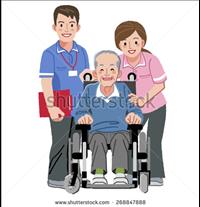|
Monday, January 23, 2017
 Recently, I had to help a relative reinstate her Medicare Part D insurance coverage after she forgot to pay the premiums for several months. The insurance company sent many notices advising that they would terminate coverage if the past-due premiums were not paid, but she either ignored the notices or could not comprehend what they said and eventually lost coverage. After spending hours on the phone first with the insurance company and then with Medicare, I realized that Medicare is somewhat of a mystery to me. Medicare is not yet my health insurance provider, so other than knowing that most of my clients are covered by Medicare and pay a monthly premium for the health insurance, I really had little idea of how Medicare works. This blog post is a general guide to Medicare, while the next four posts will explore the alphabet of Medicare in more depth. Read more . . .
Thursday, December 3, 2015
 This year, a relative of mine had two issues that affected her prescription plan. First, she was diagnosed with an illness and prescribed new drugs. Second, she forgot to pay her Medicare Part D premiums and lost her prescription coverage. How do you choose a Medicare Part D plan? How do changes in medication affect the Part D insurance plan a participant might choose? This year, a relative of mine had two issues that affected her prescription plan. First, she was diagnosed with an illness and prescribed new drugs. Second, she forgot to pay her Medicare Part D premiums and lost her prescription coverage. How do you choose a Medicare Part D plan? How do changes in medication affect the Part D insurance plan a participant might choose?
Read more . . .
Thursday, November 19, 2015
 Medicare Part B pays for doctor’s services, whether in their offices, the hospital, your home or other settings, and lab tests, screenings, medical equipment and other supplies. You will pay a monthly premium, which may be deducted from your Social Security, Railroad Retirement or Civil Service check. If the premiums are not deducted from your retirement or disability check, you will be required to pay premiums quarterly. In 2015, the monthly premium for most recipients was $104.90, though the premiums are higher if your annual income on your individual tax return is over $85,001 or on your joint return it was over $170,001. Read more . . .
Thursday, August 6, 2015
 How do we decide how we want to be treated at the end of life? What would a good day look like if you were suffering from a terminal illness? This is one of the questions Dr. Atul Gawande asks in Being Mortal, Medicine and What Matters in the End, New York: Metropolitan Books, Henry Holt and Company, 2014, his book exploring medical treatment at the end of life. Dr. Gawande looks at how this one question, along with a series of questions most physicians are not asking their patients, might shape the course of medical treatment and care of those who are terminally ill, as well as those frail elderly who are in need of long term care. In the book, one patient says that he is willing to have medical treatment for his terminal illness so long as the treatment will allow him to eat ice cream and watch football on television. Read more . . .
Thursday, July 23, 2015
 July is SANDWICH GENERATION AWARENESS MONTH The Sandwich Generation refers to those caregivers, generally between the ages of 45 and 59, who are caring for aging parents while also caring for young children or dependent young adult children. One of the issues facing many of those caregivers is how to pay for the aging parent’s long-term care needs. Long-term care refers to ongoing assistance to meet some of the basic activities of daily living, such as bathing, eating, dressing, using the toilet, transferring from bed or chair, caring for incontinence or eating. The type and cost of long-term care depends on the services necessary for the health and safety of the person. Keep in mind that Medicare does not pay for long-term custodial care.
Read more . . .
Thursday, July 16, 2015
 July is Sandwich Generation Awareness Month. The Sandwich Generation refers to those people, mostly in their mid-40’s to late 50’s, who are caring for aging parents as well as caring for young children or dependent young adult children. If you are the meat or peanut butter in that sandwich, you might be looking for help from your siblings or other family members. One of the best ways to plan the care for an aging or disabled family member is by holding a family meeting. The meeting is designed to do many things: get information from the aging or disabled person about their needs, figure out what kind of care is needed and brainstorm about ways to find that care, gauge the financial resources available for care, and assign duties to various family members so that one caregiver does not get burned out. Read more . . .
Tuesday, July 1, 2014
Joe, an 89-year-old veteran served in WWII. He and his wife, Mary, have been living in an assisted living facility for three years and Joe has been receiving VA Pension with Special Monthly Pension for Aid and Attendance. Joe recently fell, and his physician has decided Joe cannot return to the assisted living facility. Joe is now in a Nursing Home and needs to apply for Medicaid to cover the cost of his care. VA Pension Benefits can be a lifesaver for veterans or their surviving spouses who need home care or assisted living facility care. Read more . . .
Friday, November 29, 2013
 Most of us know someone who served in the military at some point in time. We’ve seen pictures of them in uniform posted on their walls, or we’ve heard them talk about when they were in Korea, or Viet Nam, or Fort Benning.
Today, there is a lot of anxiety about healthcare costs, education costs, and long-term care costs. Have you ever asked someone who served in the military whether they are receiving any benefits or have thought about receiving benefits? Often veterans or their families will say, “When my dad came back from the war, he never wanted to talk about the war and the VA just reminded him of a really bad time in his life. “ Or, my dad visited a VA hospital and it was too confusing and overwhelming for him. Read more . . .
Wednesday, November 27, 2013
 The VA provides “Community Living Centers”, or what used to be called Nursing Homes. These are operated by the VA, and are usually in a Veterans Administration Hospital. These Community Living Centers (CLC’s) provide rehabilitation for veterans recovering from injury and illness in the short-term, but also provide long-term skilled nursing care for veterans who need care for long periods of time for a service-connected injury.
For veterans rated at 70% service-connected or higher, or for those who need nursing home care for their service-connected injuries, the VA pays for their nursing home placement as part of their package of healthcare benefits.
The CLC’s are available for non-service connected veterans who are enrolled in VHA healthcare, and need short term services such as rehabilitation, hospice, respite, and for those waiting for placement in the community. Read more . . .
Sunday, November 24, 2013
As the veteran population ages, and as veterans come back from war with increasing numbers of traumatic brain injury (TBI), the number of veterans who are legally blind or have low vision is increasing exponentially. Low vision and blindness can be caused by accidents, and brain injuries, but many veterans are losing their vision because of age and disease-related factors, such as macular degeneration and diabetes. President Franklin D. Roosevelt signed an Executive Order on January 8, 1944, which declared: “No blinded serviceman from World War II (WWII) would be returned to their homes without adequate training to meet the problems of necessity imposed upon them by their blindness.” After the war ended, the VA accepted the responsibility of adjustment training for blinded veterans. Read more . . .
Saturday, November 23, 2013
 What are vocational rehabilitation benefits?
The Department of Veterans Affairs provides services for qualified veterans with service-connected disabilities who need assistance to become suitably employed or to maintain employment or who need assistance or training in order to become independent in daily living.
The services provided may include counseling, as well as education and specialized training.
Which veterans are qualified?
In order to qualify for the program, the veteran must either have, or will receive, an honorable or other than dishonorable discharge, have more than a 10% service-connected disability rating, and must apply for vocational rehabilitation services.
Generally, the veteran must apply for the vocational rehabilitation within 12 years from the separation from active duty, or from the date the veteran was first notified of a service-connected disability rating.
Once the veteran applies, a VA Vocational Rehabilitation Counselor provides a Comprehensive Evaluation, which assesses the veteran’s interests, aptitudes and abilities to determine whether the veteran is entitled to the vocational rehabilitation services and whether the service-connected disability impairs the veterans ability to find or hold a job with the skills the veteran already has. Read more . . .
The Elrod-Hill Law Firm,LLC assists clients with Estate Planning, Veterans Benefits, Medicaid, Elder Care Law, Probate, Special Needs Planning and Pet Trusts in the North Atlanta area including the counties of Dekalb, Gwinnett and Fulton.
|

|
|
|